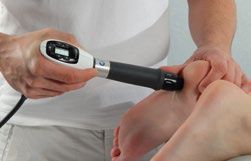Extracorporeal Pulse Activation Technology (EPAT)
At Desert Orthopaedic Center, our doctors are orthopaedic leaders who are dedicated to offering our patients the latest and most advanced evidence-based treatment options for the musculoskeletal system. As part of this dedication, we proudly offer Extracorporeal Pulse Activation Technology, an advanced noninvasive treatment option for a broad range of orthopaedic injuries and conditions.
Our board-certified, fellowship-trained foot and ankle surgeons, Dr. Abdi Raissi and Dr. Troy Watson, proudly offer this noninvasive treatment method from CuraMedix to provide relief for patients who are suffering from acute or chronic pain, soft tissue injuries, or another type of injury or condition of the musculoskeletal system, such as plantar fasciitis.
What Is Extracorporeal Pulse Activation Technology?

Extracorporeal Pulse Activation Technology, or EPAT, is a form of extracorporeal shock wave therapy. It is an evidence-based technology platform that utilizes a unique set of acoustic pressure waves to stimulate the metabolism, enhance blood circulation, and accelerate the healing process. It is one of the most advanced and highly effective noninvasive treatment methods cleared by the FDA.
Is EPAT Safe?
EPAT is an FDA-cleared technology that when performed by a qualified healthcare professional, such as one of our foot and ankle doctors, has virtually no side effects or risks, including no risk of infection or scarring. This technology has undergone extensive clinical studies and tests to confirm its safety and efficacy and is currently used all around the world.
What Is an EPAT Treatment Session Like?
EPAT is a quick, in-office treatment. Its treatment sessions usually only take 5 – 10 minutes. However, the length can vary depending on what injury or condition of the musculoskeletal system is being treated.

During the treatment process, one of our foot and ankle doctors, Dr. Raissi or Dr. Watson, will apply coupling gel to the skin of the area being treated. After the gel is applied, a handheld applicator will be used to release EPAT pressure waves over the area while it is moved in a circular motion. The pulses will slowly increase until the desired level is reached. EPAT does not require anesthesia and is generally well-tolerated.
After the session, patients are able to bear weight immediately as well as return to their normal activities within 24 – 48 hours.
Patients will typically have three to four treatment sessions on a weekly basis, depending on their injury or condition. The beneficial effects of EPAT are often experienced after three treatments. However, it can vary between patients. Some patients may experience immediate pain relief while others may take up to four weeks to begin to feel relief.
What Are the Benefits of EPAT?

An alternative to traditional treatment methods, such as surgery, EPAT improves the regenerative potential instead of further damaging an area that has degenerated due to poor blood flow, weakness, or a tissue or overuse injury. EPAT has a proven success rate that is equal to or greater than that of the traditional treatment methods, but it doesn't have the risks, complications, or lengthy recovery times that are associated with those methods.
When EPAT is performed by a qualified healthcare professional, like one of our foot and ankle doctors, it provides patients experiencing acute or chronic musculoskeletal pain with a multitude of benefits.
In addition to providing pain relief or pain reduction, EPAT does the following:
- Accelerates the healing process
- Improves blood flow and circulation
- Restores mobility
- Stimulates the metabolism
- Treats the source of the pain or injury
Is EPAT Right for You?
EPAT is designed for a wide range of podiatric and pain management uses. Patients who are suffering from acute or chronic pain or one of the following injuries or conditions generally experience relief with EPAT:
- Achilles pain
- Foot pain
- Heel pain
- Neuromas
- Plantar fasciitis
- Tendon pain
- Tendinitis, including Achilles tendinitis
Over 80% of patients treated with EPAT report to be pain-free or have significant pain reduction.
For more information about EPAT or to schedule an appointment with Dr. Abdi Raissi or Dr. Troy Watson, please call (702) 731-4088.